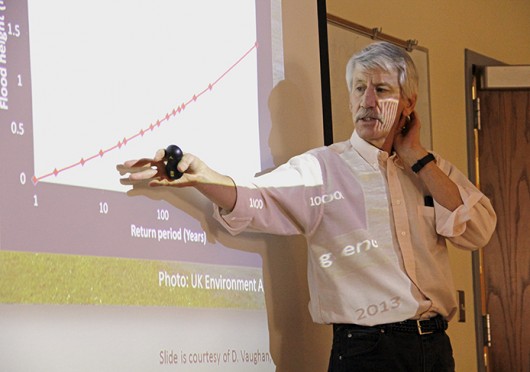
Robert Bindschadler, an emeritus scientist from NASA, speaks Friday at Derby Hall. Bindschadler talked about the issue of ice loss in Antarctica.
Credit: Ritika Shah / Asst. photo editor
One NASA scientist said hundreds of millions of people will be forced to relocate if global water levels continue to rise.
Robert Bindschadler, a NASA emeritus scientist, gave a speech at Ohio State Friday to bring the issue of ice loss in Antarctica into the sight of OSU students.
Bindschadler’s speech, titled “What Ice Sheets Hate,” addressed the relationship between climate change and shrinking ice sheets of Greenland and Antarctica.
Bindschadler said ice loss is an important issue to be aware of because it could cause the sea level to rise, which would lead to “extreme stress both culturally and economically.”
About 80 faculty and students attended the seminar, held in Derby Hall and was co-hosted by the Department of Geography and Geography Graduate Organization, said Christine Chen, a Ph.D. student in geography and a member of GGO.
Seongsu Jeong, a Ph.D. student in geodetic science, said he has read articles written by Bindschadler before.
“I am writing a paper and Dr. Bindschadler is the author of lots of articles that I have cited,” Jeong said, adding that he attended the speech out of curiosity of what Bindschadler would say.
In an interview with The Lantern, Bindschadler responded to those who consider global warming to be a myth.
“Global warming is a bad label in a scientist’s (perspective),” Bindschadler said. “Climate change is much better, and one thing that is expected with climate is more frequent extreme weather and we’ve seen that and a lot of people have (experienced that).”
Bindschadler said with future research, a more solid connection between decreased amount of ice and rising temperatures could be revealed.
“We are understanding more of these connections between how the elements of the Earth climate (are) changing and how it’s impacting weather for people in the U.S. and around the globe,” he said.
Chen said she came up with the idea of nominating Bindschadler as a keynote speaker after she met him at a conference and he brought up wanting to give speeches.
“It sounds like an interesting concept around there,” Chen said. “So I was like, ‘this person is interesting,’ so I nominated him.”
Emily Scarborough, a Ph.D. student in geography and president of GGO, said the speech is part of a colloquium series organized by the Department of Geography.
“The department actually has a colloquium series in which the department invites speakers in geography-related fields to come visit us here at OSU to talk about topics that are related to the field of geography,” Scarborough said.
Scarborough said she was able to follow the speech without a strong knowledge of the subject matter.
“I do human geography, which is a more social science. I don’t know a lot of physics, which is what he does,” Scarborough said. “But he presents it really well so it was something I could follow without knowledge of physics.”
Others said they were more familiar with Bindschadler’s specific field of study.
“Majority of the concept(s) he spoke (about) is (something) I already know,” Jeong said. “But the way that he is transferring this concept is very effective so it is very great to see how I can communicate to a person who doesn’t have too much information of climate changes.”
According to the website of the Department of Geography, the next colloquium is set to be held Feb. 28 and feature Kevin Cox, an OSU professor of geography.


